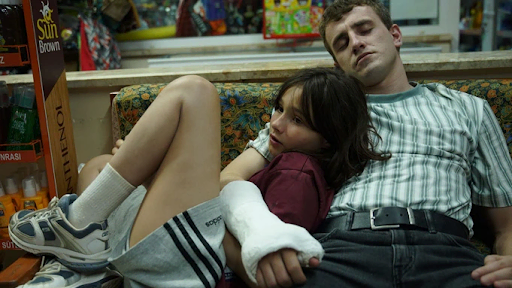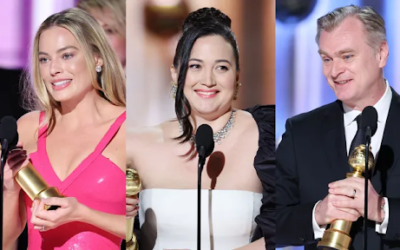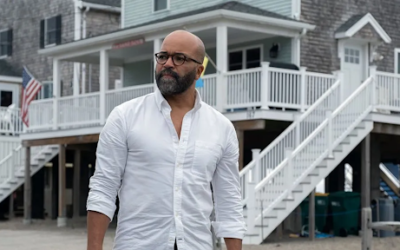Source: The Hollywood Reporter
It was only just recently that the Gotham Independent Film Awards, an event held by the United States-based Gotham Film & Media Institute, took place as it has nearly every year since its existence and awarded a select number of independently produced features be awarded with any of its cherished accolades. Less than a week later, on the other side of the Atlantic Ocean, another organization dedicated to the appreciation of independent filmmaking, the British Independent Film Awards (BIFA), held its own awards ceremony, one of many to be held annual since its inception in 1998, to honor the best independent cinema, specifically that made within the United Kingdom. It all took place in London’s Old Billingsgate Market on December 4th, with actor Ben Bailey Smith serving as the event’s host as one winner after another was announced in each included category. As one might have anticipated, several films were honored throughout the night, but by the ceremony’s end, there was one clear winner above all others, as evidenced by its collection of more BIFA prizes than any other film nominated.
With a total of sixteen nominations prior to the beginning of the ceremony, it was more or less expected that Charlotte Wells’ drama “Aftersun”, which had broken out of this year’s Cannes Film Festival and was picked up by distributor A24, would be the big winner, and while it ended up receiving less than half of the awards it was nominated for, it still took home more than any other film. Not only was the film about a complicated father-daughter relationship named Best British Independent Film, the BIFA’s equivalent of a Best Picture award, but Charlotte Wells was also honored with three awards for Best Director, Best Screenplay, and the Douglas Hickox Award for Best Debut Director. Gregory Oke, meanwhile, received the award for Best Cinematography for his work on the film, and Blair McClendon was honored with the prize for Best Editing, as was Lucy Bright through her Best Music Supervision win. In addition to these wins, “Aftersun” had also been nominated for Best Joint Lead Performance (Frankie Corio and Paul Mescal), Breakthrough Performance (Frankie Corio), Best Debut Screenwriter (Charlotte Wells), Best Casting (Lucy Pardee), Best Costume Design (Frank Gallacher), Best Make-Up and Hair Design (Oya Aygor and Murat Cagin), Best Original Score (Oliver Coates), Best Production Design (Bailur Turan), and Best Sound (Jovan Adjer and Vijay Rathinam).
Coming in second in terms of overall wins and nominations was Georgia Oakley’s debut feature “Blue Jean”, which centers around the double life of a young school teacher. Having received thirteen nominations prior to the ceremony, the film ended up taking home four BIFAs for Best Leading Performance, which went to Rosy McEwen; Best Supporting Performance, going to Kerry Hayes; Best Debut Screenwriter, which Oakley herself received; and Best Casting, which was accepted by Shaheen Baig. “Blue Jean” also received nominations for Best British Independent Film, Best Director, Best Screenplay, and Best Debut Director (all Georgia Oakley), Best Supporting Performance (Lucy Halliday), Breakthrough Performance (Rosy McEwen), Best Editing (Izabella Curry), Breakthrough Producer (Helene Sifre), and Best Ensemble Performance (Rosy McEwen, Kerrie Hayes, Lucy Halliday, Lydia Page, Stacy Abalogun, Farrah Cave, and Amy Booth-Steel).
In the category of Best Joint Lead Performance, which is given to two actors rather than one like all the other acting categories, Letitia Wright and Tamara Lawrance were awarded for their roles in “The Silent Twins”, while Safia Oakley-Green received the BIFA for Breakthrough Performance for her appearance in “The Origin”. Best Ensemble Performance, meanwhile, went to “Our River… Our Sky” and was given to cast members Zainab Joda, Darina Al Joundi, Amed Hashimi, Mahmoud Abo Al Abbas, Basim Hajar, Labwa Arab, Meriam Abbas and Siham Mustafa.
Winning both documentary categories was “Nothing Compares”, which presents the life of popular singer Sinéad O’Connor, taking home the prizes for Best Documentary Feature and Best Debut Director – Feature Documentary, the latter being accepted by director Kathryn Ferguson, who drew much applause during her acceptance speeches of these awards.“There need to be a million more Sinéads out there in the world right now”, Ferguson stated, referencing the risks the popular took throughout her career. The BIFA for Best International Independent Feature, meanwhile, went to Norway’s “The Worst Person in the World” and its director Joachim Trier, who urged the audience to dismiss the increasingly popular belief that “independent film was dying” in his acceptance speech.
Not all the awards handed out during the evening were of a competitive nature. Samantha Morton, best known for her work in “The Walking Dead” and “Minority Report” among other works, was presented with an honor for her acting contributions to British cinema, while the Special Jury Prize, which is voted on by BIFA’s main jury, was given to the organization Open Door for its work “helping talented young people without financial support or resources gain places at leading U.K. drama schools”.
In acceptance of the former award, Morton spoke out against the challenges and harassment she faced throughout her career and called upon her fellow filmmakers to stand up to such ongoing behaviors that are far too prevalent throughout the film industry. “I got fired, many times”, Morton claimed in her description of what he had to put up with and what had happened when she stood up for herself. “So thank you, BIFA, for allowing me to be here today. When you are young and those things happen to you as an actress — those things hopefully will never happen again.”




